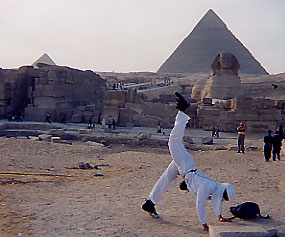America and Islam: 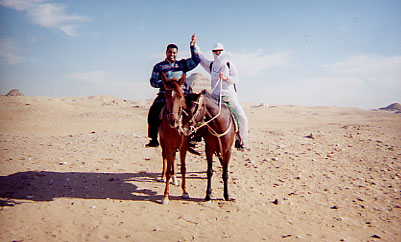 A Loving Relationship by
Julia Evergreen Keefer, Ph.D.
A Loving Relationship by
Julia Evergreen Keefer, Ph.D.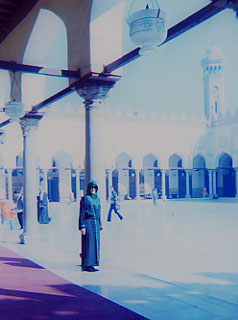
Disclaimer: In order to humanize the difficulties of cross-cultural understanding, I recount the following as a personal adventure. Cairo is such a cosmopolitan city with so many different kinds of Muslims, Christians, Jews, atheists, secularists, Buddhists, Hindus etc that this adventure is in no way a sociological study. As an imperfect human, I am not qualified to plummet the depths of the Islamic religion, nor the foundations of freedom and justice for all upon which America is founded. I seek only the beginning of a dialogue and the hope of peace, not war, between America and Islam. The following is more of a travelogue than anything else; I am converting the deeper truth behind this trip and other adventures to fiction, so please get Unclashing Civilizations, the second tome of my comic trilogy, when it comes out with Penguin in a year or two.
As President Bush was sending more and
more American troops to the Gulf in preparation for his war with Iraq
in the winter of 2003, I went to Egypt to learn more about Islam, to do
research on life in Cairo for the second tome of my comic trilogy, and
screenplay, entitled Unclashing Civilizations, and to imagine
what it might be like to make love to a terrorist. I had to write an
article for my Online Journal on Terrorism, established after 9/11 to
give my homeless, desperate students an outlet to express their sorrow
and rage and to create a forum for international discussion and
research. I wanted to spread goodwill, say a prayer for peace in the
most militant mosques, and really understand the "Arab street," a term
I now consider politically incorrect. I did not speak a word of Arabic,
knew no one in the Middle East, and was forced to travel on a sparse
personal budget with no cell phone or backup in America.
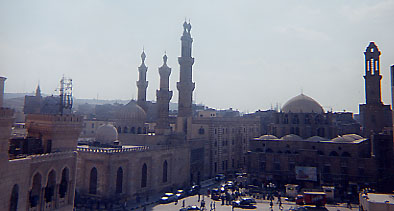
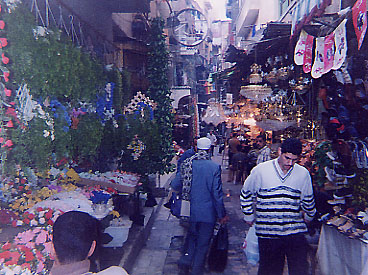
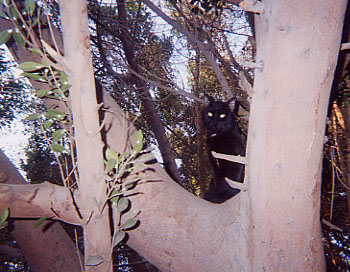
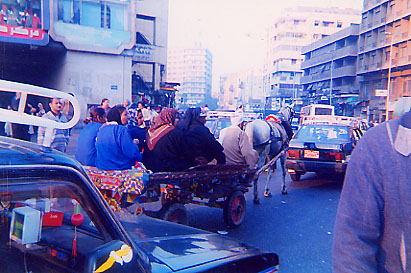
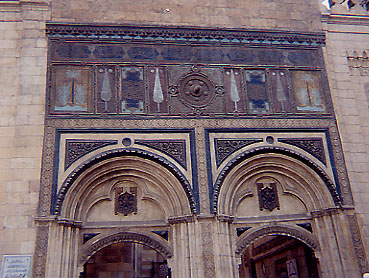
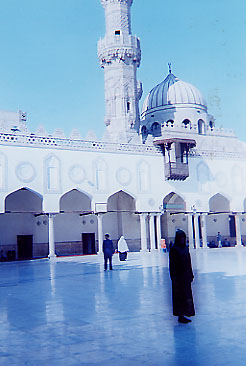
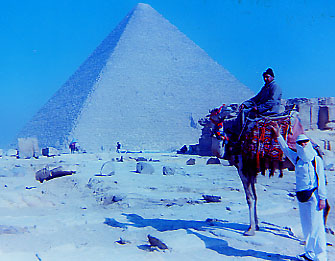 I developed a very spiritual relationship with the Sphinx (Abu el Hol
or the Father of Terror), who I felt was related to the numerous cats
of Cairo and my four cats back home.
I developed a very spiritual relationship with the Sphinx (Abu el Hol
or the Father of Terror), who I felt was related to the numerous cats
of Cairo and my four cats back home. 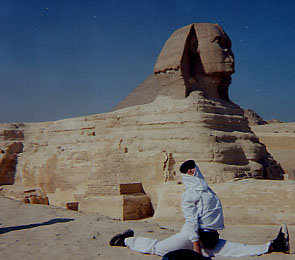 I was embarrassed that the age-old Sphinx faces the
garish emblems of America's McWorld, the cheap neon of Pizza Hut and
KFC, which were thankfully empty while I was there. As I read a sign
that said, May Peace Prevail Upon Earth,
I was embarrassed that the age-old Sphinx faces the
garish emblems of America's McWorld, the cheap neon of Pizza Hut and
KFC, which were thankfully empty while I was there. As I read a sign
that said, May Peace Prevail Upon Earth, 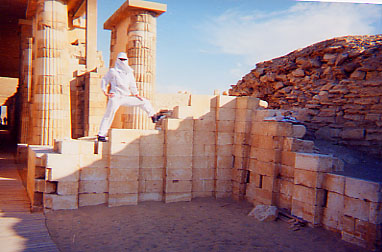 I heard tourists criticizing Bush and Blair's
bellicose strategies. After a day of jogging around the desert to get
away from camel drivers,
I heard tourists criticizing Bush and Blair's
bellicose strategies. After a day of jogging around the desert to get
away from camel drivers,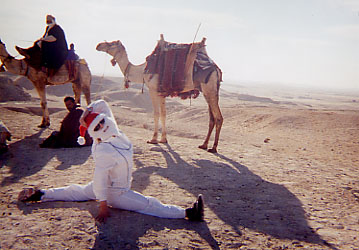 I
was exhausted, dehydrated and sick to my stomach. Afraid to take a taxi
again, I walked along Pyramid Road until a minibus filled with young
men stopped. I was squished into the back seat with the kind of men I
was looking for, but the timing was off. Suddenly I felt those infamous
Egyptian "feather fingers" moving across the bare skin of my back down
towards my waist. This wasn't the place to do research on
cross-cultural sexual habits. I gently took his hand, put it back in
his lap and said when I got out of the minibus said masaleema
alekuum (goodbye and allah be with you) in my best Arabic accent.
They laughed.
I
was exhausted, dehydrated and sick to my stomach. Afraid to take a taxi
again, I walked along Pyramid Road until a minibus filled with young
men stopped. I was squished into the back seat with the kind of men I
was looking for, but the timing was off. Suddenly I felt those infamous
Egyptian "feather fingers" moving across the bare skin of my back down
towards my waist. This wasn't the place to do research on
cross-cultural sexual habits. I gently took his hand, put it back in
his lap and said when I got out of the minibus said masaleema
alekuum (goodbye and allah be with you) in my best Arabic accent.
They laughed.
I spent some time in the Egyptian and
Islamic museums, marvelling at the beauty of death in the former and
the intricacies of geometric design in the latter, thinking that modern
physicists and mathematicians should study these forms and shapes. This
confirmed my feeling that Islam, without its militancy and cultural
suppression, could be one of the great contributors to twenty-first
century civilization. The local street sheikhs were very impressed that
I was going to the Islamic museum because most tourists restrict their
travels to Egyptology and the Egyptian Museum in Tahrir Square.
Although I was researching Cairene life and learning about Islam, I had
not yet come close to making love to a terrorist. I wanted to meet the
kind of men Americans classify as the "Arab street" or terrorist
sympathizers. I didn't think anyone was going to actually tell me about
a terrorist plot, but I wanted to know what they hate most about
America, why and how they would fight, and what part of their lifestyle
is most threatened by McWorld and/or the American government.
By the end of the week, I had been mistaken for a Muslim several times,
at which point I said I was a Muslim spiritually, but not culturally,
because of my background, career, and interests. After a few phrases in
Arabic, my accent was good enough to prompt long, fast replies which I
did not understand. I was passing for a resident rather than a tourist
in Doqqi. I began to enjoy the hotel with its cleanliness, its CNN and
Arabic channels, the ten trees filled with birds and cats outside my
window. Some of the smokers had left, and the worst air stayed in the
shisha bar near the roof.
To counteract the effects of car and smoke pollution, bad water, air
and food, I began a health regime, drinking fresh orange juice and the
protein powder I had brought from New York, eating at a cheap salad bar
buffet at the Sheraton, and working out at health clubs. I arrived at
the Sheraton dressed in hijab and abeya with a huge backpack, filled
with water. Then I stripped down to shorts and a halter top to work out
on the machines, showered and put the Egyptian clothes back on. One of
the trainers watched me for a while and after seeing me practice
kickboxing moves, asked for my passport. Instead I showed him my
college ID with red instead of blonde hair. Suddenly the Sheraton was
"no longer accepting day visitors." I argued with him to no avail,
wondering if he thought I was some kind of terrorist, because of the
combination of muscles and headscarf. So I left and strolled down the
banks of the Nile where I found Gold's Gym.
Of all the American establishments I saw, American University of Cairo
with its beautiful cats guarding the Neo-Islamic entrance, 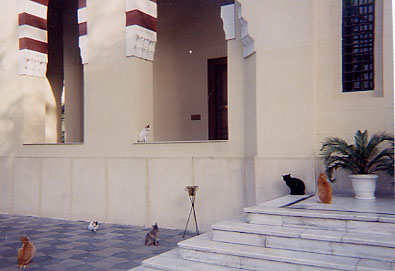 and Gold's Gym seemed most
respectful of Islam. Gold's Gym is above a papyrus store and although
it looks like any modern, luxurious gym in America, it also has a
separate women's gym facing the Nile, a prayer mat in the locker room
facing east, and the possibility of exercising in hijab. Of course I
exercised American-style and when I took the abs class, there were
twenty Egyptian men looking in through the door. Islamic culture has
not yet curbed all my exhibitionism. I was the only woman in the
kickboxing class, taught by a master from the famed Gezira club. Since
I did the warm-up better than anyone else, they wanted me to be the
teacher, but I knew they were all much better fighters than me. And so
they were as they punched and kicked the bag with a ferocity that
outshone their physiques. I was comparatively clumsy, punching air and
occasionally missing the bag.
and Gold's Gym seemed most
respectful of Islam. Gold's Gym is above a papyrus store and although
it looks like any modern, luxurious gym in America, it also has a
separate women's gym facing the Nile, a prayer mat in the locker room
facing east, and the possibility of exercising in hijab. Of course I
exercised American-style and when I took the abs class, there were
twenty Egyptian men looking in through the door. Islamic culture has
not yet curbed all my exhibitionism. I was the only woman in the
kickboxing class, taught by a master from the famed Gezira club. Since
I did the warm-up better than anyone else, they wanted me to be the
teacher, but I knew they were all much better fighters than me. And so
they were as they punched and kicked the bag with a ferocity that
outshone their physiques. I was comparatively clumsy, punching air and
occasionally missing the bag.
"Be more cruel," they kept saying, and I couldn't help thinking of the
hijackers of 9/11. Then I started to box a bag with such venom that my
lapis lazuli necklace was shattered into pieces. They said they would
buy me another one, but I said that was okay. Then we traded
self-defense techniques; they taught me how to break joints and I
showed them a quick wrestling throw followed by a speedy upper cut to
the balls that I made up for emergencies. During my days as an adjunct
professor at a Catholic college, I was forced to wrestle professionally
to make ends meet, and now I teach kickboxing. They were very
impressed.
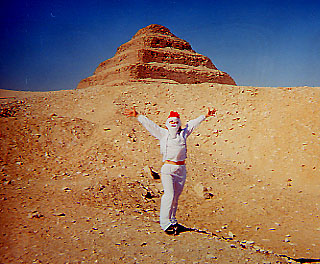
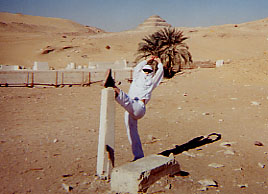
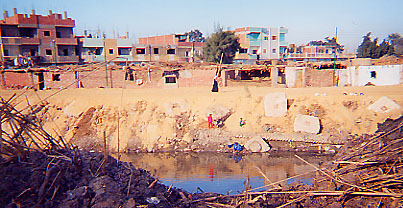
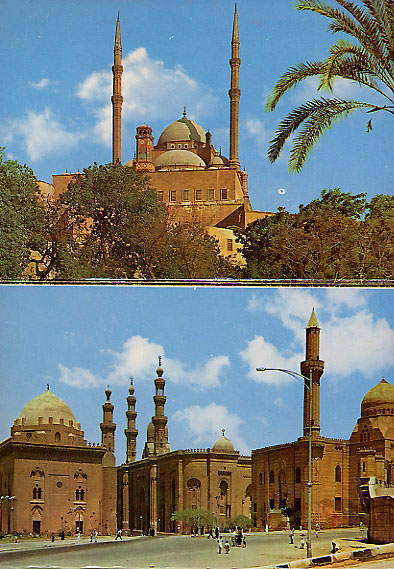
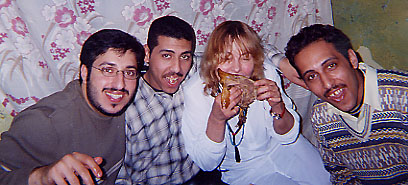
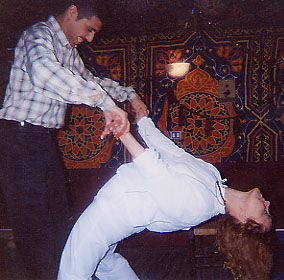
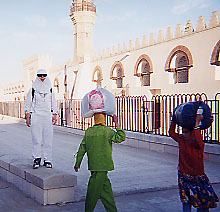
The men felt that imposing American-style democracy in the Middle East
may not be the answer 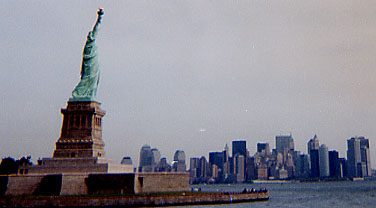 because these countries respect strong leaders and don't
like wasting money and energy on campaigning; they feel the constant
turnover of presidents, is like "using too much toilet paper." (If you
have visited Arab countries, where water squirters are used instead of
toilet paper, this statement has symbolic significance.) If freedom and
democracy come to the Middle East, Central Asia and North Africa,
Islamist governments might implement Sharia, not French or British law,
versions of what is currently in place in Saudi Arabia or Iran. Sharia
may have to be reformed to incorporate scientific and circumstantial
evidence and to mitigate the more extreme forms of punishment, but let
the people decide what kind of democracy or leadership they need.
because these countries respect strong leaders and don't
like wasting money and energy on campaigning; they feel the constant
turnover of presidents, is like "using too much toilet paper." (If you
have visited Arab countries, where water squirters are used instead of
toilet paper, this statement has symbolic significance.) If freedom and
democracy come to the Middle East, Central Asia and North Africa,
Islamist governments might implement Sharia, not French or British law,
versions of what is currently in place in Saudi Arabia or Iran. Sharia
may have to be reformed to incorporate scientific and circumstantial
evidence and to mitigate the more extreme forms of punishment, but let
the people decide what kind of democracy or leadership they need.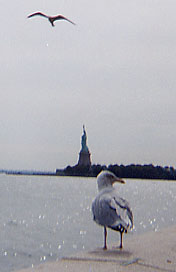 Regime changes should
occur as a result of internal choice, not American imposition or even
suggestion.
Regime changes should
occur as a result of internal choice, not American imposition or even
suggestion.
I don't like the words fundamentalism or extremism when applied to
Islam because Islam is a fundamental, in some senses, extreme religion,
a blending of church and state, a call to prayers five times a day, a
spiritual awareness all the time. It is only with this focus, on the
resonant spot between the eye and head chakras that the meaning of
peace and submission comes. Islam can be as extreme and fundamental as
it likes, but I have trouble when it get militant, or cruel as the
kickboxers would say, for this compromises the religion as well as
threatens non-Muslims. Hopefully when it has more confidence in itself,
twenty first century Islam will not be so eager to censor intellectuals
and artists. I am not forgetting the intellectual terrorism that tried
to silence Naguib Mahfouz, Nawal el Saadawi, Abu Zeid, Farag Foda, Taha
Hussein, Salman Rushdie, and Sahar Khalifeh, a Palestinian censored by
the Israelis.
For America and Islam to get along better, the Islamists must have the
confidence to reject terrorism, and the massacre of innocent civilians
and give voice to their passionate souls and refined intellects on an
equal but different platform with the west. America must export the
best of its healthy lifestyle, science, technology and intellectual
freedom rather than the junk food of McWorld, the stupidity of some of
mainstream television, the arrogance and aggression of its terrorizing
military tactics. The dilemmas over Iraq and Palestine must be solved
as soon as possible in a way that does not hurt Muslim civilians,
respects their homes, their land and their religion. It must be easier
to be a Muslim in the United States. It is important for America to be
more supportive of Muslim lifestyle, to make it easier to pray five
times a day and go to the mosque on Fridays, to adopt Islamic dress,
diet and behavior, and to build more mosques. Although many will
disagree, building a beautiful mosque in downtown Manhattan dedicated
to peaceful Jihadhis would be a way of upstaging those militants who
feel violence is the only way for Islam to get recognition. It would
also be a way of protecting Americans because it is haram for
Muslims to kill Muslims. What Islam offers America is the beauty,
resonance and holistic simplicity of its religion, as seen in the light
and spaciousness of the mosques, and a way to mitigate the deleterious
effects of idolatry, consumerism, lookism, narcissism and ageism. 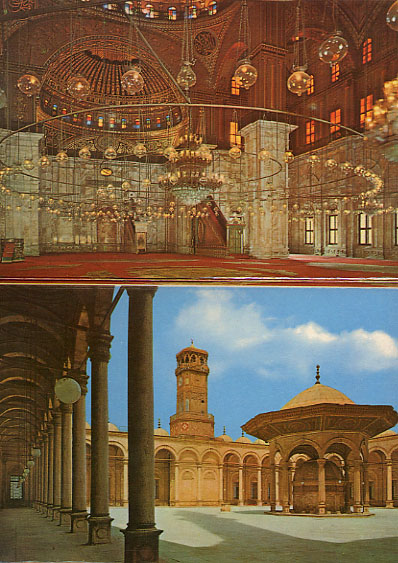
At the same time differences must be respected. I quote Khalil Gibran:
"You were born together, and together you shall be forever more....But
let there be spaces in your togetherness. And let the winds of the
heavens dance between you. Love one another but make not a bond of
love: Let it rather let be a moving sea between the shores of your
souls...Give your hearts, but not into each other's keeping. For only
the hand of Life can contain your hearts. And stand together yet not
too near together: for the pillars of the temple stand apart, And the
oak tree and the cypress grow not in each other's shadow."(18-21)
This moving sea is the ocean that separates us. When America or Israel occupy a Muslim land, some sheikhs issue fatwas for the third level of jihad which has recently activated an invisible army of cyberterrorists and low tech germ jihadhis ready to annihilate American civilization. Is there any way America can fight this invisible war without destroying the world itself? Just for a change, let us try to get along and foster a loving relationship between Islam and America, while still prosecuting criminal acts by any civilization.
P.S. April 2003: After Operation Iraqi
Freedom, how will the "Coalition Forces" reconstruct this impoverished,
but potentially wealthy country? Will the United States build mosques,
restore palaces and museums and establish ecologically sound and
culturally sensitive projects, or will McWorld take over with its
shopping malls, big business skycrapers, devastating highways and
byways? Will America's greed for oil, protection of Israel, and desire
for global superiority mitigate her desire to forge a respectful
relationship with peaceful Islam? When cultures clash, they also
fertilize each other; underneath the fierce fight there is often envy,
need, desire and yes, love. Will America use this opportunity to grow
spiritually and culturally and be a model for freedom, tolerance and
diversity, or will she force the worst, instead of the best, of her
mindbodyspirit on another poor, indigenous culture? History doesn't
have to repeat itself.
Bibliography
Read Ashley
Makar's beautiful Egyptian poetry!
The following books describe life in Egypt, Israel, Palestine, the Gulf
States, and the pilgrimage to Mecca, as well as provide primary source
interviews, speeches and original writing by Islamic militants. Many of
these books have been censored by Egypt, Israel, Iran, Iraq, or avoided
or unavailable in America. It is only by reading our critics, that we
learn to survive.
Abdo, Geneive. No God but God: Egypt
and the Triumph of Islam. New York: Oxford University Press, 2000.
Adler, Mortimer J. We Hold These Truths: Understanding the Ideas
and Ideals of the Constitution. New York: Collier Books, 1987.
Al-Qa'id, Yusuf. War in the Land of Egypt. New York: Interlink,
1998.
Ali, Tariq. The Clash of Fundamentalisms:Crusades, Jihads and
Modernity. New York: Verso, 2002.
Bakr, Salwa. The Wiles of Men. Cairo: American University of
Cairo Press, 1997.
Berman, Morris. The Twilight of American Culture. New York:
W.W.Norton, 2000.
El Ramly, Eman. Women's Perceptions of Environmental Change in
Egypt. Cairo: American University of Cairo Press, 2002.
El Saadawi, Nawal. The Hidden Face of Eve. God Dies by the Nile.
Women and Sex in Egypt. Women at Point Zero. Try Zed Books for
Translation.
Esmail, Aziz. The Poetics of Religious Experience: The Islamic
Context. New York: St. Martin's Press, 1999.
Fallaci, Oriana. The Rage and the Pride. (Wherever you can get
it.)
Gibran, Kahlil. The Prophet. London: Penguin, 1992.
Hussein, Taha. The Days. Cairo: American University of Cairo
Press, 1997.
Kaplan, Robert D. The Arabists: The Romance of an American Elite.
New York: Simon & Schuster, 1995.
Jeffrey, Arthur, translator. The Koran. Mineola, New York:
Dover Thrift Editions, 2001.
Khalifeh, Sahar. Wild Thorns. New York, Interlink Books, 2000.
Khatami, Mohammad. Islam, Liberty and Development. Binghampton,
N.Y.: Institute of Global Cultural Studies, 1998.
Mahfouz, Naguib. The Cairo Trilogy. The Day the Leader was Killed. (all
of his work).
Munif, Abdelrahman. Cities of Salt Trilogy. New York: Vintage
International, 1989.
Qutb, Sayyid. In the Shade of the Koran. Milestones. (Anywhere
you can get them.)
Netanyahu, Benjamin. Terrorism: How the West Can Win. New
York: Avon Books, 1986.
Rashid, Ahmed. Jihad: The Rise of Militant Islam in Central Asia.
New Haven: Yale University Press. 2002.
Rifaat, Alifa. Distant View of a Minaret. Portsmouth, NH:
Heinemann Publishers, 1983.
Rubin, Barry and Judith Colp. Anti-American Terrorism and the
Middle East: A Documentary Reader. New York: Oxford University
Press, 2002.
Smith, Jane I. Islam in America. New York: Columbia University
Press, 1999.
Soueif, Ahdaf. In the Eye of the Sun. The Map of Love. New
York: Anchor Books, 2000.
Stark, Freya. Baghdad Sketches. Evanston, Illinois: Northwestern
University Press, 2000.
Tainter, Joseph A. The Collapse of Complex Societies. New
York: Cambridge University Press, 1988.
Tusi, Nasir Al-Din. Contemplation and Action: The Spiritual
Autobiography of a Muslim Scholar. New York: St.Martin's Press.
1999.
Weaver, Mary Anne, A Portrait of Egypt: A Journey Through the World
of Militant Islam. New York: Farrar, Straus and Giroux, 2000.
Wilentz, Amy. Martyr's Crossing. New York: Ballantine Books,
2001.
Wolfe, Michael. The Hadj: An American's Pilgrimage to Mecca. New
York: Grove Press, 1993
The spiritual and the material
by Julia Evergreen Keefer, Ph.D. Evergreen Goes to Egypt:
